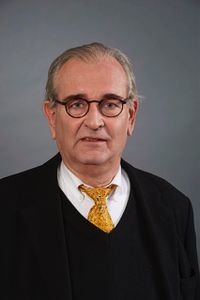Rüdiger Dillmann KIT Karlsruhe Institute of Technology, Karlsruhe, Germany
Neurorobotics in the Human Brain Project: Robot Sensor-Motor Controls Based on Spiking Neural Clouds
This talk presents a functional control framework for neuro-robotics platforms. The required robot controls are based on the plasticity of spiking neural clouds known from neuroscience and cybernetics. The work is part of the European FET-Flagship "Modelling the Human Brain" where simulated humanoid and other robots as well as human body model are be connected with a brain simulator and with neurohardware to study learning of sensor-motor body control schema. A neurorobotics simulator platform is used to study neural control mechanisms for visual servoing, grasping and body motion in particular. Learning of body schema, of coordinated whole body walking patterns and of learning of grasping activities are typical experiments to evaluate spiking neural clouds. An important aspect is to identify the simplest neuronal circuit capable of providing specific functionality and to use the circuit for the analysis and implementation in neuromorphic robot technology and neuromorphic systems engineerin. The first devices based on small, low ganularity models are to be scaled up to become more powerful and energy efficient whole body controls. As the project progresses towards the human brain truly intelligent humanoid robot controls and adequate world representations with a broad range of applications are considered. Actuators and sensorial feedback like vision, haptics and acoustics are to be discussed. As a starting point the brain of a mouse has been mapped with high granularity and implemented in a super computer. The model is used to study the behaviour of the mouse, its body-motion-schema, its receptors and its behaviour in a simulated virtual environment to support both mapping of brain functionalities and understanding basic neural adaptive control principles. Emphasis is given to the highly flexible synaptic plasticity supporting learning of various closed loop and feed forward contol principles.

Rüdiger Dillmann received his Ph. D. from University of Karlsruhe in 1980.
Since 1987 he has been Professor of the Department of Computer Science and is Director of the Research Lab. Humanoids and Intelligence Systems at KIT. 2002 he became director of an innovation lab. at the Research Center for Information Science (FZI), Karlsruhe. Since 2009 he is spokesman of the Institute of Anthropomatics at the Karlsruhe Institute of Technolog and founder of the KIT – Focus Anthropomatics and Robotics.
His research interest is in the areas of humanoid robotics with special emphasis on intelligent, autonomous and interactive robot behaviour based on machine learning methods and programming by demonstration (PbD). Other research interests include machine vision for mobile systems, man-machine interaction, computer supported intervention in surgery and related simulation techniques.
He is author/co-author of more than 850 scientific publications, conference papers, several books and book contributions.
He was Coordinator of the German Collaborative Research Center ”Humanoid Robots”, SFB 588 and several European IPs. He is Editor of the journal ”Robotics and Autonomous Systems”, Elsevier, and Editor in Chief
of the book series COSMOS, Springer. He is IEEE Fellow.